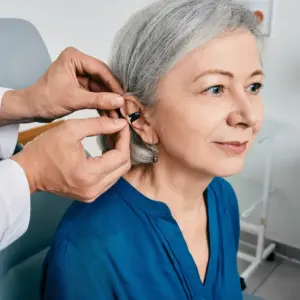Tinnitus Management: Finding What Helps With Tinnitus
Living with tinnitus, characterized by persistent ringing, buzzing, or clicking sounds in the ears, can be a challenging experience for many. Although it’s not a disease itself, tinnitus often signifies an underlying condition related to the auditory system. This comprehensive guide delves into understanding tinnitus, its potential causes and symptoms, and a variety of methods to alleviate its impact on daily life.
Unraveling Tinnitus: Causes and Symptoms
Tinnitus can arise from a multitude of sources:
- Hearing Loss: Common culprits include age-related hearing loss and noise-induced damage. When inner ear hair cells are damaged, the brain may create phantom sounds to compensate for the loss of normal auditory input.
- Inner Ear Disorders: Conditions like Meniere’s disease, benign tumors, or inner ear malformations can trigger tinnitus.
- TMJ Dysfunction: Issues with the temporomandibular joint can affect nerves and muscles connected to hearing.
- Medications: Certain drugs, including some antibiotics and high doses of aspirin, list tinnitus as a side effect.
- Head and Neck Injuries: These can harm the auditory system, leading to tinnitus.
- Stress and Anxiety: While not direct causes, mental health issues can worsen or make tinnitus more noticeable.
Symptoms vary widely, from the type and intensity of sounds heard to accompanying difficulties in concentration, sleeping, and increased anxiety or depression. Understanding these symptoms is crucial for effective management and treatment.
Lifestyle Adjustments: What Helps With Tinnitus Management
Several lifestyle changes can significantly mitigate tinnitus:
- Reducing Noise Exposure: Avoid environments with extremely loud noise to prevent further damage to hearing.
- Avoiding Silence: Paradoxically, total silence can make tinnitus more noticeable. Soft background sounds can be helpful.
- Dietary Changes: Decreasing salt intake, which can affect blood pressure, is beneficial. Monitoring caffeine and nicotine consumption is also recommended.
- Regular Exercise: Physical activity can reduce stress, improve blood flow, and generally enhance well-being, which can indirectly affect tinnitus symptoms.
- Stress Management: Techniques like yoga, meditation, and relaxation exercises play a vital role in managing tinnitus.
- Education: Understanding the condition empowers individuals to seek appropriate treatments and cope better.
Medical and Therapeutic Interventions
While there’s no one-size-fits-all medication for tinnitus, options exist:
- Medications: Some antidepressants and anti-anxiety medications can alleviate symptoms. However, it’s important to discuss potential side effects and suitability with a healthcare provider.
- Treating Underlying Conditions: Addressing issues like TMJ disorders or earwax blockage can provide relief.
- Exercise Therapy: Activities like yoga not only reduce stress but also show promise in decreasing tinnitus severity.
- Mindfulness-Based Stress Reduction (MBSR): This therapy helps in refocusing attention and reducing the impact of tinnitus.
Nutritional Supplements and Tinnitus
Though no definitive cure exists in vitamin form, certain supplements might be what helps with tinnitus:
- Vitamin B12: Linked to nerve health, B12 deficiency has been associated with tinnitus in some studies.
- Magnesium and Zinc: These minerals play roles in nerve and ear health. Supplementation has shown benefits in some cases but requires more research.
- Herbal Supplements: Ginkgo biloba, known for its circulatory benefits, and melatonin, used in sleep regulation, have been studied for tinnitus relief with mixed results.
Learn more about supplements for hearing health.
What Helps With Tinnitus? Advanced Stress Management Techniques
Stress management is key in tinnitus treatment:
- Relaxation Techniques: Guided imagery, self-hypnosis, and progressive muscle relaxation can effectively reduce stress.
- Art and Music Therapy: These creative outlets offer emotional release and relaxation, which can lessen tinnitus symptoms.
- Social Support: Connecting with others and sharing experiences can provide emotional relief and practical coping strategies.

Hearing Aids and Sound Therapy
Hearing aids can be particularly effective for those whose tinnitus accompanies hearing loss:
- Amplification and Masking: Hearing aids can amplify external sounds to mask tinnitus or alter its perception. They may also include white noise or sound therapy features.
- Customizable Programs: Many devices offer tinnitus-specific settings to help users find the most comfortable and effective relief.
- Psychological Benefits: Using hearing aids can empower individuals, giving them a sense of control over their condition.
Learn more about which hearing aid brand is best.
Sound Therapy in Detail
Sound therapy employs various methods to provide relief:
- Sound Generators and Instruments: Devices that produce white noise or other soothing sounds can mask tinnitus.
- Environmental Sounds: Using fans, radios, or other household sounds can also be effective.
- Music Therapy: Tailored music therapy can provide distraction and relaxation.
Understanding the nuances of hearing aids and sound therapy can greatly enhance your approach to managing tinnitus. These methods not only offer practical relief but also contribute to a deeper sense of well-being and control over your auditory environment. Exploring these options can lead you to discover what helps with tinnitus, enabling a more comfortable and enjoyable daily experience.
Sleeping with Tinnitus: Techniques for a Restful Night
Managing tinnitus at night is crucial for good sleep quality:
- Using White Noise: Sound machines or apps can mask tinnitus sounds.
- Bedroom Environment: Ensuring a comfortable sleeping environment, with appropriate bedding and temperature, can aid in better sleep.
- Sleep Hygiene: Establishing a consistent bedtime routine and avoiding stimulants before bed can improve sleep quality.

Empowering Yourself Against Tinnitus and Finding Support
Actively managing tinnitus through a combination of lifestyle changes, medical treatments, stress management techniques, and sound therapy can significantly improve your quality of life. It’s crucial to remember that while tinnitus can present challenges, a combination of diligent self-care and professional guidance can make a substantial difference.
Each person’s journey with tinnitus is unique, and discovering what works best for you is the key to easing the ringing and embracing a more serene, comfortable life. If you’re navigating the complexities of tinnitus and looking for personalized support and expert guidance, Stanford Hearing is here to help.
We encourage you to reach out to us at Stanford Hearing for tailored advice about what helps with tinnitus. Our team of experienced professionals is dedicated to helping you find the relief you need and improving your overall hearing health. Contact us today to start your journey toward a quieter and more peaceful life.
